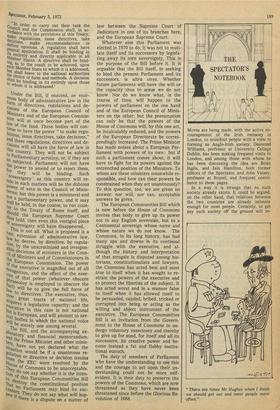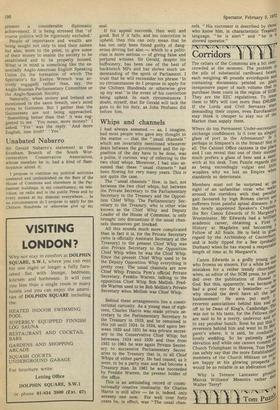THE SPECTATOR'S, NOTEBOOK
Moves are being made, with the active encouragement of the Irish embassy in London, to soundout people with a view to forming an Anglo-Irish society. Desmond Williams, professor at University College Dublin, has been making frequent visits to London, and among those with whom he has been discussing the idea are Brian Inglis, and lain Hamilton, both former editors of the Spectator, and John Vaisey, professor at Brunel, and frequent contributor to these pages. In a way it is strange that no such society already exists. It could be argued, on the other hand, that relations between the two countries are already intimate enough for most people. Certainly, to get any such society off the ground will re present a considerable diplomatic achievement. It is being stressed that 'of course politics will be rigorously excluded.'
People of importance and wealth are being sought not only to lend their names but also, more to the point, to give some of their money to enable the society to be established and to be properly housed. What is in mind is something like the essentially Anglo-American English Speaking Union (in the formation of which The Spectator's Sir Evelyn Wrench was actively engaged) rather than, say, the Anglo-Russian Parliamentary Committee or the Anglo-Spanish Society. Naturally, when money and Ireland are mentioned in the same breath, one's mind turns to Guinness. But I gather thatthe Guinnesses are not being approached. 'Something better than that' it was suggested to me. 'You mean, more money?' I asked. 'Yes' was the reply. 'And more English, less Irish? " Yes.'
Unabated Nabarro
Sir Gerald Nabarro's statement at the Evesham Branch of the South Worcestershire Conservative Association, whose member he is, had a kind of flamboyance about it: I propose to continue my political activities unabated and undiminished on the floor of the House of Commons and elsewhere in the Parliament buildings, in my constituency, on television, on radio and in the public Press and by every means at my disposal everywhere... In no circumstances do I propose to apply for the Chiltern Hundreds or otherwise give up my seat.
If his appeal succeeds, then well and good. But if it fails, and his conviction is upheld, then this can only mean that he has not only been found guilty of dangerous driving but also — which to a politician is more serious — of giving false and perjured witness. Sir Gerald, despite his buffoonery, has been one of the best of backbench MPs and has shown much understanding of the spirit of Parliament. I trust that he will reconsider his phrase 'In no circumstances do I propose to apply for the Chiltern Hundreds or otherwise give up my seat' in the event of his conviction being upheld. In such circumstances I doubt, myself, that Sir Gerald will lack the guts to do his duty, as John Profumo did before him.
Whips and channels
I had always assumed — as, I imagine, had most people who gave any thought to the matter — that the "usual channels" which are invariably mentioned whenever deals between the government and the opposition of the day have to be done, was a polite, if curious, way of referring to the two chief whips. Moreover, I had also assumed that these "usual channels " had been flowing for very many years. This is not quite the case.
The "usual channels" flow, in fact, not between the two chief whips, but between the Private Secretary to the Parliamentary Secretary to the Treasury and the Opposition Chief Whip. The Parliamentary Secretary to the Treasury, who is other wise known as the Chief Whip and Deputy Leader of the House of Commons, is only brought into discussions if the usual channels themselves get blocked.
All this sounds much more complicated than in fact it is, for the Private Secretary (who is officially Assistant Secretary at the Treasury) to the present Chief Whip was also Private Secretary to the Opposition Chief Whip when he was the Chief Whip. Since the present Chief Whip used to be the Deputy Opposition Whip everything is pretty cosy. The usual channels are now Chief Whip Francis Pym's official Private Secretary, Freddie Warren, talking to the Opposition Chief Whip Bob Mellish. Freddie Warren used to be Bob Mellish's Private Secretary when Mellish was Chief Whip.
Behind these arrangements lies a constitutional curiosity, As a young man of eighteen, Charles Harris was made private secretary to the Parliamentary Secretary to the Treasury in 1919, and he remained in this job until 1924. In 1924, and again between 1929 and 1931 he was private secretary to the Conservative Chief Whip; but betweeen 1924 and 1929 and then from 1931 to 1961 he was again Private Secretary to successive Parliamentary Secret aries to the Treasury that is, to all Chief Whips of either party. He had ceased, as it were, to be a party man and had become a Treasury man. In 1961 he was succeeded by Freddie Warren, the present holder of the office.
This is an astounding record of constitutionally creative continuity. Sir Charles Harris is still alive — he is, indeed, only seventy one now. For well over forty years he, in effect, was "The usual chan nels. " His successor is described by those who know him, in characteristic Treasury language, "he is alert" and "he is a shrewd operator."











































 Previous page
Previous page